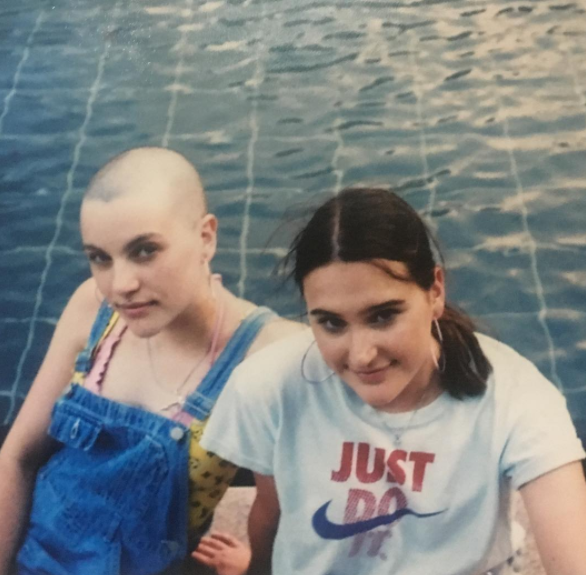My first week of year seven had just ended, and I came home that Friday afternoon feeling accomplished. As I took off my blister inflicting new shoes, my mother told me not to panic before even saying hello. “Kat’s in the hospital,” the right foot came off. “She’s been diagnosed with anorexia nervosa,” left foot off. “We’re going to go visit her tomorrow.” Standing there in my socks, I felt my triumphant glow dissipate.
I remember my reply was nothing more than “okay.” I went to my room unsure if I should cry—I didn’t know what anorexia was. No one really talked about it at dinner; it didn’t feel real at the time.
Seeing my sister in a hospital bed the next day made me realise that, yes, she was sick. That this was the reality. That something had happened that made her need a tube in her nose. The summer before she was first admitted, she had been taking incredibly long runs, eating lots of no-fat yoghurts and not much else. She was watching America’s Next Top Model religiously and arguing with our parents a lot.
This was before I knew anything about eating disorders. I didn’t know that drinking excessive amounts of diet coke and baggy clothes were tell-tale signs. I didn’t know how hard they were to recover from. I thought she would come out of her first hospital stay “better”.
I was 12 then, and I’m 20 now. My sister’s eating disorder that began as a product of her depression and insomnia has come into form as a union of OCD, BPD, anxiety, bulimia, body dysmorphia and severe alcoholism.
We’ve just lost touch this year after her behaviour towards my little sister became violent. Sally, three years my junior, moved into my share house and since then we have been talking lately about the effect our sister’s illness had on our adolescence. There are so many things I wish someone had told me—from when I was 12 and just learning what anorexia meant to when I was in Year 10 and facing my own mental health issues, and even now as I am about to graduate from university.
So, below are the 10 things no one tells the siblings of people living with mental illnesses—but they deserve to know.
1. It’s A Long Road To Recovery

Sally, Kat and I with her pet snake Severus
Mental illnesses aren’t ‘cured’ like other illnesses, and even if you sibling appears to be getting better, relapses are bound to happen. It’s not your job to guide them to recovery, that’s on your parents and health care professionals. You’re just there to be their friend, and be patient with your sibling, as often these things are ‘one step forward, two steps backwards.’
2. Your Problems, Big Or Small, Are Valid
It might feel like talking about something upsetting that happened at school is nothing compared to what your sibling is going through. You might feel selfish or guilty complaining. Don’t. Your feelings are valid simply because you feel them. This one is hard to grapple with because on one hand, you are gaining significant perspective by learning to cope with emotional trauma at a young age, but on the other, that shouldn’t diminish the seemingly “small” problems you face.
3. You Have The Same Genetics As Your Siblings
If your sibling has been diagnosed with a mental illness, it’s natural that all the attention goes into helping them get the treatment they need. As young adults, Rosie (my second oldest sister), Sally and I have only now begun seeking help for our own respective mental illnesses. I wish someone had told me “it’s not you, it’s your genes.” I wish my parents had taken me to see someone sooner. I wish I had protected my younger sister from the same demons I faced in silence, as I felt like my illness wasn’t real because it wasn’t “as bad” as Kat’s.
4. You Are Allowed To Be A High Achiever
If your sibling needs to spend months in the hospital while you continue to go to school, you might get better grades, have an easier time getting into university or getting a job. You’re allowed to set goals for yourself, pursue your dreams, and you don’t need to feel guilty that your sibling might not have had the same opportunities. You are on your own path, independent of your family. You might feel bad or as though your sibling is jealous of you, but that doesn’t mean you aren’t entitled to flourish. And it doesn’t mean your sibling can’t achieve goals either; they too are on their own path and there is no linear route of checkpoints and achievements that lead to success. They deserve to focus on healing. Don’t compare your lives! You do not exist through a lens comparative to your siblings.
5. It’s Okay To Acknowledge That What Is Going On Is Hard For You
It feels awful saying your sibling’s illness is affecting you, that it’s making you cry at school, lose sleep, alienate yourself from your peers and so on. Your sibling doesn’t expect you to be an emotionless rock. You can be honest with yourself about the strain of seeing someone you love fight something so deadly. It’s hard! But you’re not a bad person for recognising that it’s hurting you. In fact, acknowledging your feelings will help you cope and in turn, you can be of better support to your sibling. You can talk to them about it as well because they understand better than anyone what is going on. Rely on each other, but also take care of yourself.

Sally at the Chinese Garden Of Friendship in Sydney. We spent the afternoon reflecting on our shared experiences (Photo credit: Emma Arnold)
6. It’s Not Your Sibling’s Fault…
Rosie once said to Kat in a fit of tears that she was so sad she had lost her best friend, that her eating disorder had taken her away. In private, she said to me that she wished Kat had cancer instead of anorexia, so she could talk about it with her friends. I was young and didn’t understand how dangerous this language was. Your sibling had no choice! They did not choose to be sick. Their illness should be treated the same as any other. And they are still there! Your sibling is a person, who is hurting. They deserve to be loved, despite what might be going on in your family.
7. …But A Mental Illness Doesn’t Justify Abuse
There came a point in more recent times where living at home was dangerous for me and my sister. Having lived with such serious mental illnesses for eight years has taken a huge toll on Kat, and her behaviour became emotionally abusive and violent. You can still love your sibling but it’s important to acknowledge when their behaviour becomes detrimental. You are not a bad person for having to step away from your family, or seeking help. Intervention Orders exist to protect you, and Legal Aid is free. Our mother couldn’t accept how big an issue it was, but professionals will understand and show no judgement. Don’t be afraid to seek help, because the reality is that having a mental illness does not give someone the right to abuse you. Ever.
8. Things Don’t Go Back To ‘Normal,’ Instead, Your Normal Just Changes
You have to accept there is no light at the end of the tunnel, and that your family won’t go back to “the way it was before”. You will grow older, your family dynamics will shift, and you will enter a new phase of your life. Try not to see that as a bad thing, or better yet, let go of this finite ‘before’ and ‘after’ concept, where your sibling’s illness is the defining point on your timeline.
9. You’re Allowed To Talk To Your Friends About It
I found it hard to talk to my friends because I felt like it wasn’t my story to tell, and I kept everything that was going on to myself. Your life and your reality is something true friends will want to understand, and keeping an illness in the family a secret further perpetuates the stigma that there is something shameful about them. Talk to your friends, be honest when you are ready and know that they will not treat you differently or judge you.
10. You Are On Your Own Path To Recovery As Well
My first point was that your sibling will need time to recover. Well here’s a clue—so do you. There’s no shame in that, you are not taking away the spotlight from your sibling, you are not being selfish or disrespectful to their struggles. You are making a respectful decision towards yourself by saying, yes, I need to heal as well.

Sally and I bush walking in NSW. (Photo credit: self-timer)
The Eating Disorders Helpline is 1300 550 236 or (03) 9417 6598 and offers support to people experiences eating disorder or similar issues.
Beyond Blue’s support networks can be found here.
You can call Legal Aid Victoria during business hours on 1300 792 387 for free legal advice.
Call Life Line on 13 11 14 for crisis support.
The Kids Helpline is not just for kids. Anyone up to the age of 25 can call, and they provide excellent emotional support and guidance. Call them on 1800 55 1800.






